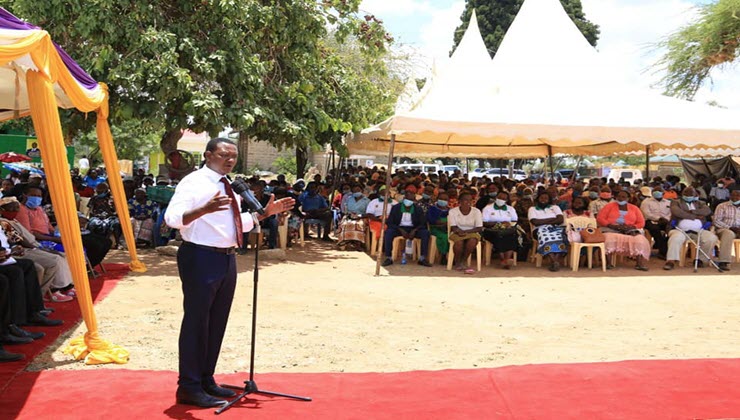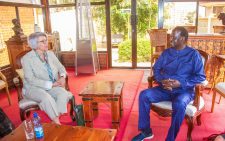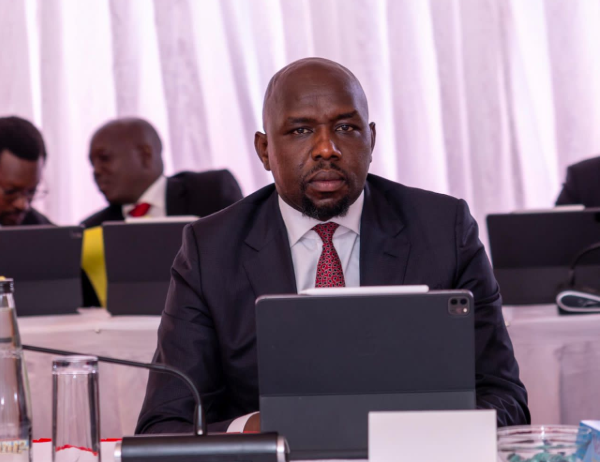Mutua gives farmers Sh22 million, says start-up funds available in joint EU-Danish Embassy project

Some farmers’ groups in Mwala sub-county, Machakos County have benefited from Sh 22,197,550 under the Kenya Climate Smart Agriculture Project.
Speaking in Muthetheni market in Mwala Sub-County on Saturday, March 13, while presiding over the issuance of the cheques, Machakos Governor Alfred Mutua said the donation is meant to enhance farming activities through direct government support, local and international partnerships.
“Today, we have embarked on an empowerment program to our farmers in the semi-arid regions of Machakos County,” Dr Mutua.
The governor said that the county government is committed to boosting the financial muscle of farmers by ensuring that they benefit from their produce.
“Over the last seven years, the local department of agriculture has been able to distribute 795,792 tonnes of seeds and 36,000 bags of fertilizer. This has led to increased yields that have seen the county exit the arena of food donations,” he said.
“We have also been able to plough 12,932 acres of arable land during the rain seasons through our tractors program. It is through these large-scale farming activities that our farmers have been able to feed our people and also our neighbors in Nairobi and Kajiado counties,” he added.
The governor said that through the hatchery program, over 121,118 chicks, 211,500 fingerlings have been distributed to farmers as well as vaccination of over one million animals.
“Through the program, over 11,946 farmers have been provided with certified farm inputs through contributory E-voucher system and 33 motorbikes issued to extension officers to help them reach out to farmers,” he added.
The Maendeleo Chap Chap leader said rain-based agriculture is no longer sustainable because of climate change and the adverse effects of global warming.
“My government has heavily invested in digging boreholes and earth dams and hundreds of families have taken advantage of this to engage in irrigation farming. We have also been keen on modernizing agricultural activities by adopting modern farming techniques,” he said.
The governor further urged the youth and women groups to visit agriculture offices in Machakos and apply for startup funds from the recently launched AgriBiz national program funded by the European Union and Danish Embassy.
“It is time to work smart, find homegrown solutions to local challenges and I am confident that empowering our food producers is the first step towards a healthy and empowered nation,” he added.
Last month, Machakos County in partnership with the European Union and the Danish Royal Embassy launched the National AgriBiz Programme in a concerted effort to help improve food security and eradicate poverty.
Speaking when he hosted the European Union Ambassador to Kenya, Simon Mordue, the governor said the decision to launch the call for applicants for the programme in Machakos stems from the realization that the county has made significant progress in addressing food security since devolution.
In five years, the programme is expected to create 17, 000 jobs in the agricultural sector across the country and increase smallholder production, improve food security, and boost household incomes, especially for youth and women.
Agribiz is achieving this by funding 2, 400 women and youth-led agribusinesses over a period of five years at a cost of Sh5.1 billion.
An additional Sh17.1 billion in loans will also be leveraged from local financial institutions to support the enterprises in selected counties.
Since Kenya is largely an agricultural country, investments in Small Medium Enterprises in the agri-business sector will also help the economy bounce back from Covid-19.
Applicants from neighboring counties are also encouraged to apply.
Machakos County will accept applicants from Makueni, Kajiado and Kitui, while Kisii will accept applications from Nyamira, Kericho, Kisumu, Migori and Homa Bay, Bomet and Nakuru counties.
Uasin Gishu will cover Nandi, Elgeyo Marakwet, Baringo, Turkana, and West Pokot, while Isiolo will cover Garissa, Wajir, Mandera, Marsabit and Samburu counties.
Successful applicants to the programme will benefit from training, business advisory, and financing to promote the sustainable use of natural resources and encourage appropriate agribusiness practices.












